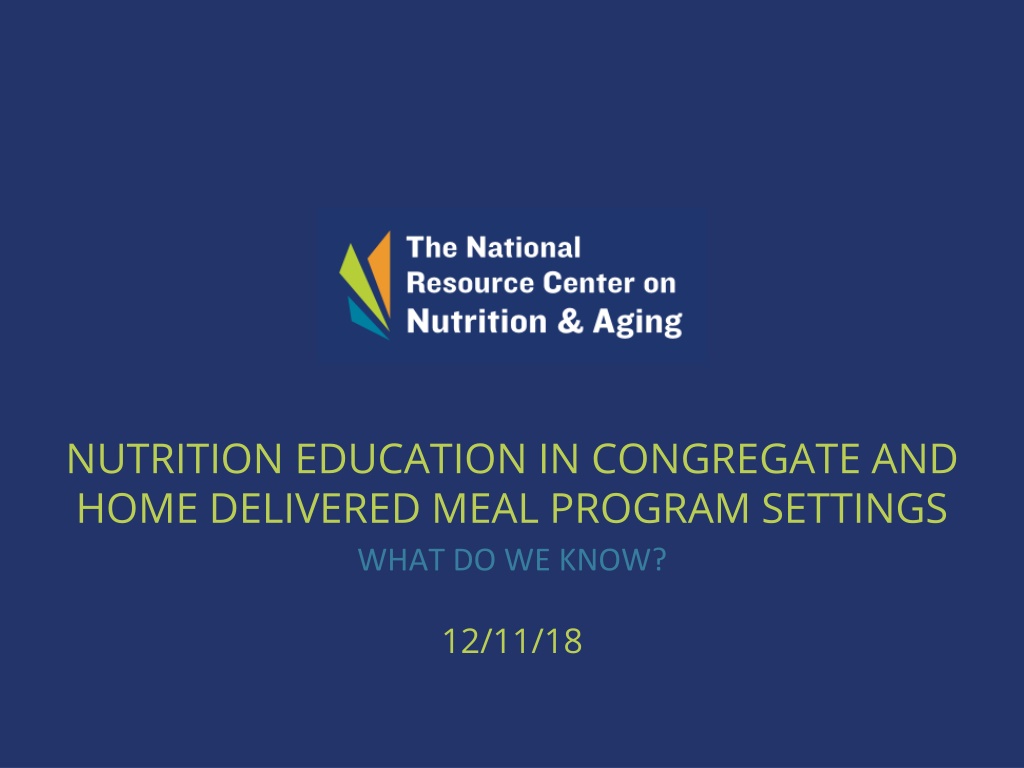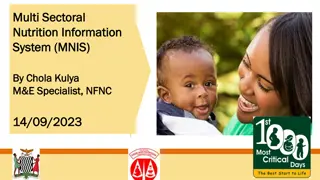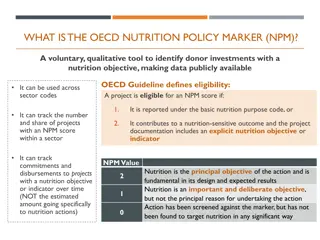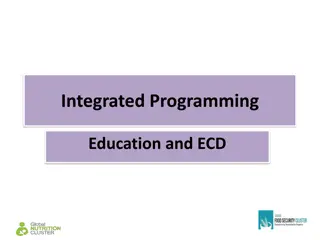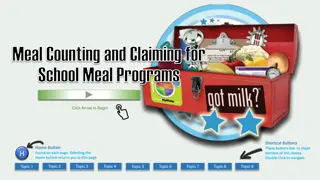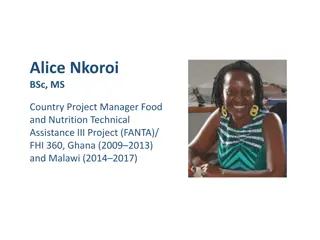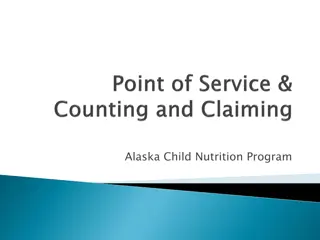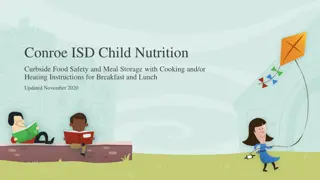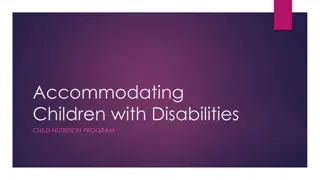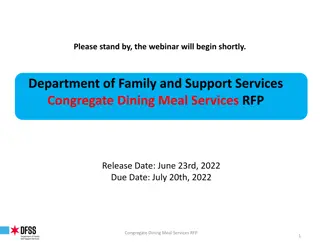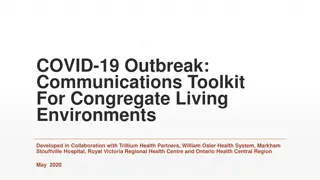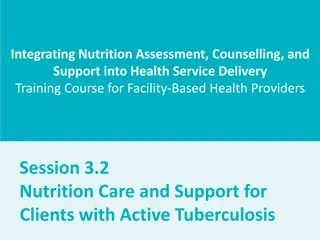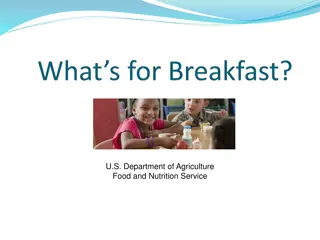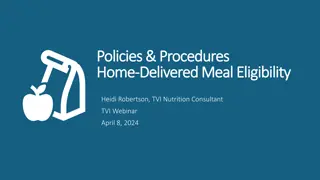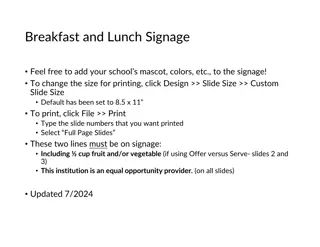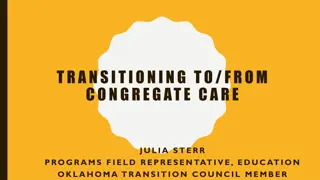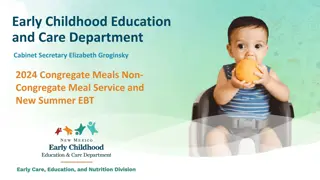Nutrition Education in Congregate and Home Delivered Meal Programs
Adequate nutrition is crucial for successful aging, especially among older adults. This research explores the type and frequency of nutrition education provided in congregate and home-delivered meal programs. It examines the differences between education by dietetics and non-dietetics professionals and discusses incorporating theory-based and behaviorally focused sessions. Survey results highlight the credentials of participants and the importance of nutrition education in these settings.
Download Presentation

Please find below an Image/Link to download the presentation.
The content on the website is provided AS IS for your information and personal use only. It may not be sold, licensed, or shared on other websites without obtaining consent from the author. Download presentation by click this link. If you encounter any issues during the download, it is possible that the publisher has removed the file from their server.
E N D
Presentation Transcript
NUTRITION EDUCATION IN CONGREGATE AND HOME DELIVERED MEAL PROGRAM SETTINGS WHAT DO WE KNOW? 12/11/18
NUTRITION EDUCATION IN CONGREGATE AND HOME DELIVERED MEAL PROGRAM SETTINGS: WHAT DO WE KNOW? Christina Riccardo, EdD, RD Rowan University Glassboro, NJ
OVERVIEW Learning Objectives Background Purpose of Research Methodology Description of Survey Participants & Findings Overview of Nutrition Education Materials Implications for Practice
LEARNING OBJECTIVES Describe the current state of nutrition education delivered to congregate and home delivered meal program participants; Discuss the differences in education provided by non-dietetics professionals and dietetics professionals; Explain how to incorporate theory-based and behaviorally focused nutrition education into nutrition education sessions. 4
BACKGROUND Adequate nutrition is a key component of aging well. Congregate and home-delivered meal programs are an ideal setting in which to provide nutrition education for older adults that can lead to increases in successful aging. Additional impetus for conducting this research came from my personal experience as a nutrition educator.
PURPOSE OF RESEARCH Purpose To identify the type and frequency of education; lessons theory-based and behaviorally-focused; if credentials mattered; evaluation of nutrition education efforts. Method Cross-sectional, national study; Survey of nutrition educators.
PROFESSIONAL CREDENTIALS OF SURVEY PARTICIPANTS Dietetics Professionals (n = 189) Non-Dietetic Professionals (n = 152) Registered Dietitian Health and Human Services degree Licensed Dietitian Certified Dietary Manager Dietetic Intern Registered Nurse Licensed Practical Nurse Social Worker Licensed Social Worker Thank you to those of you who participated in this research!
SURVEY PARTICIPANT CHARACTERISTICS Almost 70% in profession for 10+ years; Almost worked with older adults for 10+ years. 59% dietetics professionals had master s degree; 27% non-dietetic health professionals had a master s degree; Almost 60% of participants were over the age of 50; 89% of the participants were female.
NUTRITION EDUCATION SESSIONS CHARACTERISTICS More than 80% worked in both home delivered and congregate meal settings; More dietetic professionals were responsible for 10 sites than non-dietetic health professionals (56% vs. 35%); Most common group size for nutrition education was 10-20 (28.8%); Most common length for education session was between 15-20 minutes (50%).
% EDUCATORS COVERING TOPICS IN PAST TWO YEARS 70 60 50 40 30 20 10 0 Meal Planning PA Na&K HTN Malnutrition Fat Protein Label Reading Diabetes Hydration Fiber Ca&D MyPlate CHO Osteoporosis CVD Eating on Budget Healthy Eating Sustainability Healthy Snacking Supplements Drug/Nutrient Interactions Wt Eating Alone Food Safety Cooking for 1 or 2 Age Related Appetite Loss
POLL QUESTION: HOW OFTEN DO YOU DEVELOP YOUR OWN NUTRITION EDUCATION MATERIALS/SESSIONS VS. USE OFF-THE- SHELF CURRICULA? -USUALLY -SOMETIMES -RARELY -NEVER
CRITERIA USED FOR CHOOSING MATERIALS 29% choose materials that focus on specific behavior change; 32.5% choose materials based on nutrition risk assessment; 82.5% choose materials that cover topic clients are interested in; 73.4% choose materials that are targeted. This Photo This Photo by Unknown Author is licensed under CC BY-NC-ND CC BY-NC-ND
CRITERIA USED FOR CHOOSING MATERIALS (CONT.) Delivery considerations: Interesting activities (41.3%) Easy to teach/implements (56%) Can teach in allotted time (34.9%) Provides all teaching materials needed (38.9%) Materials already familiar with (14.3%) Organization selected for me (8.3%) Simple messages (63.1%) Practical (63.5% Cost (29%) This Photo This Photo by Unknown Author is licensed under CC BY CC BY
METHODS OF DELIVERY 80 70 60 50 40 30 20 10 0
MATERIALS USED FOR NUTRITION EDUCATION SNAP-ED/County extension materials State Department on Aging Nutrition education materials State University extension programs Company materials Eat Smart, Live Strong MyPlate DASH diet Chef Charles/Fresh Conversations Eat Better & Move More Cooking Matters Healthy Eating for Successful Living in Older Adults
SATISFACTION WITH NUTRITION EDUCATION MATERIALS Question: Are you satisfied with the nutrition education materials you use? On a 4 point scale: 0 = not satisfied 1 = neutral 2 = somewhat satisfied 3 = satisfied 4 = very satisfied Average Score = 2.2
SATISFACTION WITH NUTRITION EDUCATION MATERIALS (CONT.) Question: Would you like more resources to provide education? Scale 0-4 0 = definitely not 1 = probably not 2 = might or might not 3 = probably yes 4 = definitely yes Average Score = 2.84
BARRIERS TO CONDUCTING NUTRITION EDUCATION WITH OLDER ADULTS Total (%) Dietetics Professionals Non-Dietetic Health Professionals Lack of materials available 23.0 19.1 27.1 No budget for nutrition education activities 52.8 49.5 56.8 No promotion of nutrition education sessions 21.4 26.6 16.9 Staff unaware of visits/unprepared 7.4 9.2 5.7 Competitive events scheduled 16.6 18.3 14.4 No incentives 26.6 27.5 26.3 Clients/participants not interested 47.6 44.0 51.7 Lack of time 38.4 40.4 37.3 No access to cooking resources 17.5 24.8 11.0 No computer/projector 19.2 21.1 16.7 Difficulty getting/maintain participant attention 48.0 44.0 52.5
FACILITATORS TO CONDUCTING NUTRITION EDUCATION WITH OLDER ADULTS Total (%) Dietetics Professionals Non-Dietetic Health Professionals More nutrition education materials available 49.6 44.5 55.3 Larger budget for nutrition education 57.5 52.7 63.2 Promotion of nutrition education sessions 35.0 37.3 33.3 Congregate meal site staff/participants prepared for visit 28.3 34.5 22.8 Decrease in competing events 18.6 21.8 14.9 Increased participant interest 51.3 43.6 58.8 More time for preparation and delivery of nutrition education 32.4 32.1 33.3 Access to cooking resources (i.e., hot plates) 20.8 30.0 12.3 Access to projector, computer 21.2 24.5 17.5
WHY CHOOSE THEORY-BASED, BEHAVIORALLY FOCUSED EDUCATION MATERIALS? Required for behavior change to occur and be sustainable; Involves lessons that target specific dietary behaviors; Example: Eat more vegetables at dinner Includes goal setting Helps participants identify barriers to achieving goals Strategies to overcoming barriers
GOAL OF NUTRITION EDUCATION The goal of nutrition education is to change behavior. Creating or selecting a nutrition education curriculum that can aid in this effort is key. Health behavior change is critical but challenging to do. Public health practitioners have developed theories to understand how behavior change can occur. A theory is a systematic approach to understanding events, behaviors and/or situations. Theories are supported through understanding how behavior change occurs in real life in day to day work settings or via research evidence.
WILLINGNESS TO USE EVIDENCE-BASED MATERIALS Total (mean) Dietetics Professionals Non-Dietetic Health Professionals 3.01 (0.91) 3.01 (0.87) 3.03 (0.94) Would use evidence- based nutrition education program if available 1.80 (1.1) 1.91 (1.0) 1.69 (1.1) Have funding for reasonably priced evidence based materials No significant difference between those surveyed!
EXAMPLES OF THEORY-BASED AND BEHAVIORALLY FOCUSED NUTRITION PROGRAMS
THEORY-BASED AND BEHAVIORALLY FOCUSED NUTRITION PROGRAMS Fresh Conversations Newsletter-based nutrition education; Includes a section intended to facilitate discussions; Funded by SNAP and can be accessed online; Video and free training guide are available.
THEORY-BASED AND BEHAVIORALLY FOCUSED NUTRITION PROGRAMS (2) Eat Better and Move More (EBMM) Developed by the National Policy and Resource Center on Nutrition and Aging at Florida International University 12 weekly sessions Mini talks and activities for group nutrition and physical activity sessions Guidebook is available to educators Designed to be just 30 minutes for each session
THEORY-BASED AND BEHAVIORALLY FOCUSED NUTRITION PROGRAMS (3) Eat Smart Live Strong: Nutrition Education for Older Adults Developed to increase fruit and vegetable intake and physical activity. Free online resources Includes leader s guide; Interactive education sessions; Ready-to-go participant handouts; Marketing flyers. This Photo by Unknown Author is licensed under CC BY-NC-ND
THEORY-BASED AND BEHAVIORALLY FOCUSED NUTRITION PROGRAMS (4) Cooking Matters Empowers resource- limited families to eat better for less. 6-week cooking classes. In-store educational curricula available.
Q & A QUESTION: WHAT RESOURCES WOULD ENABLE YOU TO PROVIDE THEORY-BASED, BEHAVIORALLY FOCUSED NUTRITION EDUCATION?
IMPLICATIONS: WHAT DO WE KNOW? Create a repository of materials and programs: Track the nutrition education curricula you use; Stay informed on availability of new materials and programs. This Photo This Photo by Unknown Author is licensed under CC BY-NC-ND CC BY-NC-ND
DIETETICS VS NON-DIETETICS CREDENTIALED EDUCATORS: CONDUCTING TBBF NUTRITION EDUCATION Total (mean) Dietetics Professionals (mean) Non-Dietetic Health Professionals (mean) T p Rationale 2.80 (0.76) 2.96 (0.68) 2.67 (0.80) -3.36 0.001 Enhance Motivation 2.33 (0.71) 2.96 (0.68) 2.18 (0.74) -3.24 0.001 Facilitate Action 1.90 (0.93) 2.13 (0.91) 1.72 (0.90) -3.54 <0.001 Create Supportive Environment 2.11 (0.95) 2.29 (0.87) 1.97 (0.97) -2.75 <0.001 Delivery Considerations 2.29 (0.68) 2.49 (0.62) 2.11 (0.70) -4.29 Total
IMPLICATIONS: WHAT DO WE KNOW? (CONT.) More training and resources at the local and national levels are needed for all educators, especially non-dietetic professionals focusing on: Theory-based, behaviorally focused nutrition education: What it is, Why it matters, and How to incorporate it into nutrition lessons Program administrators are encouraged to develop training manuals and how-to guides to support provision of high-quality nutrition education.
TAKE HOME MESSAGES Theory-based, behaviorally focused nutrition education is recommended; Theory-based, behaviorally focused nutrition education is available; Many evidence-based programs are available for free or low cost; More awareness raising and training on availability of materials needed: Especially for non-dietetic professionals.
REFERENCES 1. Fresh Conversations training: https://idph.iowa.gov/inn/fresh- conversations/coordinators/training-materials 2. Fresh conversations resources: https://idph.iowa.gov/inn/fresh- conversations/coordinators/resources 3. Eat Smart, Live Strong manual and resources: https://snaped.fns.usda.gov/nutrition-education/fns- curricula/eat-smart-live-strong 4. Cooking Matters website and resources: https://cookingmatters.org/ 5. Eat Better and Move More resources: http://nutrition.fiu.edu/You_Can/index.asp
THANK YOU! CHRISTINA RICCARD0, EDD, RD RICCARDO@ROWAN.EDU
New tools and resources UPCOMING WEBINAR
NUTRITION EDUCATION WEBINAR: PART 2 Nutrition Education In Congregate And Home- Delivered Meal Program Settings Where Do We Go? Date: December 13, 2018 Time: 3:30pm ET To Register: Visit the National Resource Center On Nutrition And Aging s Website Join Us!
